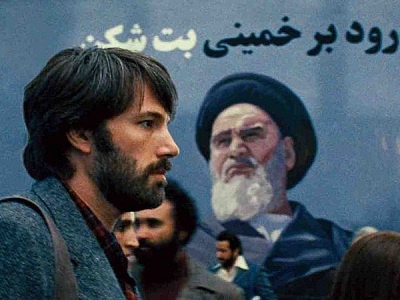
By Sarah Gillespie – London
It is a rather curious time for Hollywood to launch a blockbuster movie based on the worst US/Iranian diplomatic fallout in history. Currently Iran is threatened with attack from the West almost on a daily basis, and sanctions have devastated the rial, plunging millions into poverty for the crime of (allegedly) developing the same weapons that Iran’s agitators enjoy without reprisal. Meanwhile, in the fantasy emporiums of high street cinemas, millions of moviegoers across the world are invited to imagine the opposite scenario, a tale in which the innocent Western subject is faced with extinction at the whim of an Iranian aggressor.
Ben Affleck’s ‘Argo’ is a nailbiting thriller based on the incredible true story of the CIA operation that rescued 6 American diplomats from the turmoil of a revolutionary Iran. Conspicuously, the film barley touches on the central humiliating debacle of the Iranian hostage crisis in which 52 Americans were held for 15 months and 8 American servicemen were killed during a fiasco of a ‘rescue mission’, commonly blamed for costing Carter the 1980 election. Instead, the narrative depicts a parallel, minor side-story of an America that duped the Persians with lashings of moral superiority and machiavellian cunning. Indeed, an uninitiated Western audience would almost certainly leave the cinema with the firm impression that the Iranian hostage crisis was one of the most triumphant episodes of US history – instead of one of the most embarrassing.
Ben Affleck’s film goes out of its way to deflect the kind of criticism I offer here. He begins the movie with a quick narrated round-up of Iran’s pre-revolutionary history, including a confession of the CIA/MI5 coup that replaced the democratically elected Mosaddegh with the universally despised Shah. In one scene, an Iranian mocks our heroic CIA protagonist with dialogue straight out of Edward Sied’s ‘Orientalism’, accusing the American of seeking “snake charmers and flying carpets”. Affleck is clearly well-versed in standard post-colonial discourse. His film delivers its main points with a disingenuous candour that enables the audience to feel superior without feeling like a supremacist. But the pseudo Western self-criticism is undercut by the fact that, aside from one traitor, there is not one single Iranian who is remotely likeable in the entire film. The Iranians in ‘Argo’ are essentially a screaming, braying mass of hysterical mobs. They bang on cars, smash buildings, exploit children, torch flags and torment innocent people. They are scary, suspicious, and innately violent. Most harrowing of all, their streets are peppered with cranes hung with the corpses of collaborators. For the audience, it is almost impossible to root for any character that acquiesces in such a harrowing spectacle. And yet, for some reason, the fact that the American Ronnie Lee Gardner was executed by firing squad in the state of Utah in 2010 never made it into a Hollywood movie. Garner’s death wouldn’t seem too pretty in HD surround-sound either. In short, ‘Argo’ ultimately reinforces the binary opposition of a civilized West and a savage Iran. We hear a lot of Farsi in the movie, but only when Farsi is spoken by a Western character is the dialogue given subtitles. Farsi spoken by Iranian characters in the film is merely incomprehensible noise. Here the film accurately mirrors our contemporary reality, in which we inflict our discourse on Iranians, but are incapable of listening to theirs.
We all know that in Hollywood, narratives are applauded for their appeal, not their accuracy. Fictional reconstructions of past events do not claim to ask questions about history. What they do provide are parables loaded with collective wishes, hopes, fears and unarticulated anxieties. In this movie (and in real life) the Americans escape Iran by pretending to be a Canadian film crew with a real, bona fide Jewish Hollywood producer, LA studio backing, reviews in the Californian press, posters, merchandise and a genuine commissioned script about alien invaders taking over the planet. It is this movie within a movie that makes ‘Argo’ a complex example of the power of fiction, to not only tell a story, but also to shape reality. Both espionage and filmmaking rely on telling complicated lies that people need, not necessary to believe in, but to suspend our disbelief. As such, ‘Argo’ provides a respite from America’s encroaching anxiety surrounding its own impotence at a time when it was locked in conflict with an enemy it failed to conquer in the past. It retells the tale of the worst fiasco in US/Iranian history as if the West had triumphed. But the West didn’t triumph then, and it may not triumph now. The film implores us to differentiate between what we know and what we believe. It tells us that if we all invest in the myth of Western omnipotence the West might prevail. Let’s see if it works.
– Sarah Gillespie is a British-American singer songwriter based in London. Visit: www.sarahgillespie.com.She contributed this article to PalestineChronicle.com.






Brilliant review and a great counterpoint to the lavish jingoistic praise for Argo. Thank you, Sarah, for presenting the pro-Iranian view of this film and the damage it does to US relations with the Middle East.